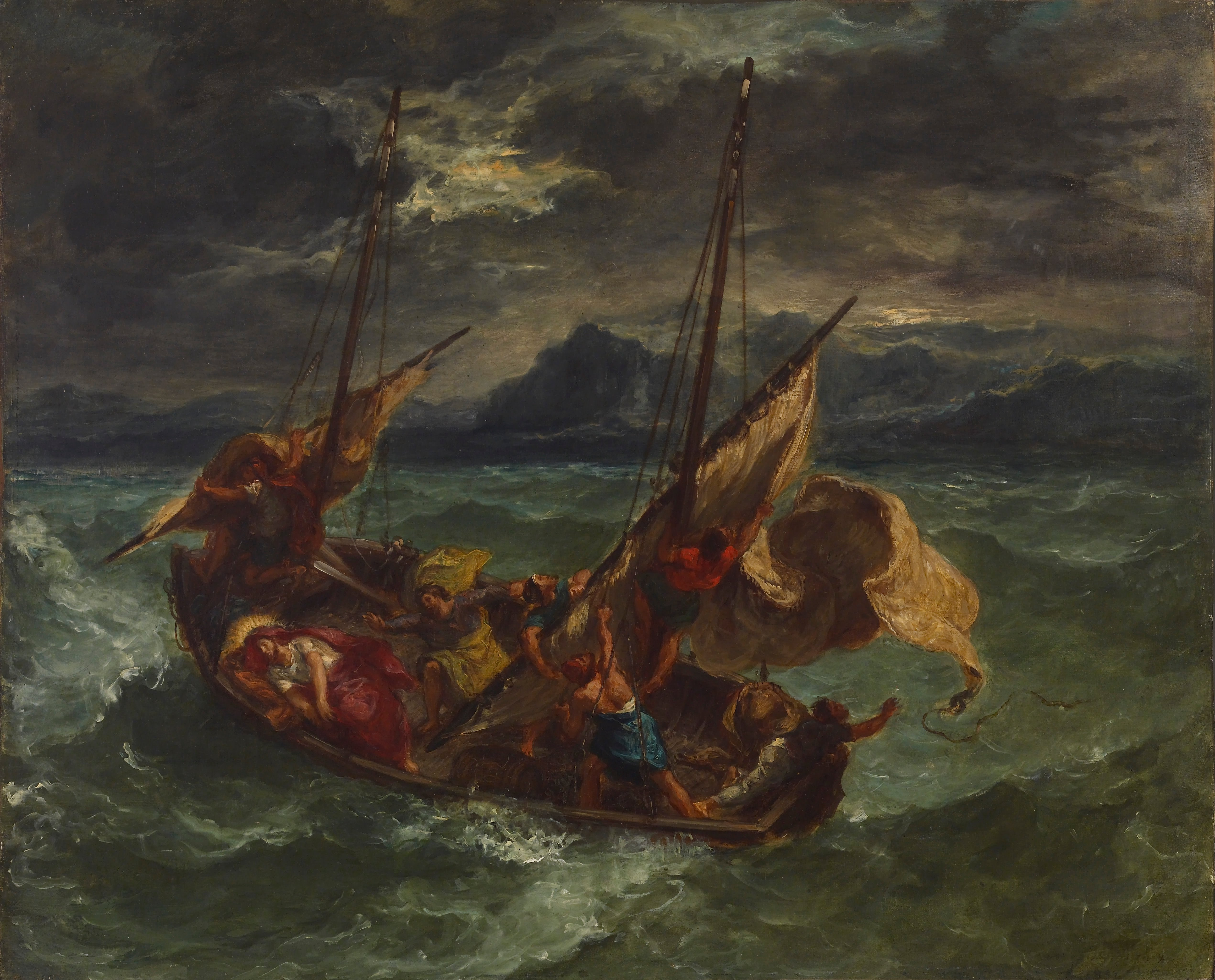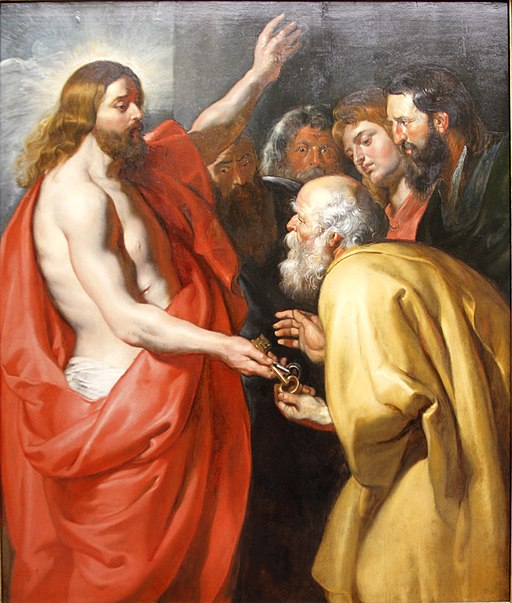When the disciples of John the Baptist approached Jesus and asked, “Why do the Pharisees and we fast much, but your disciples do not fast?” At that time, fasting was emphasized as a public way to give up food and appear pious to others. For the Jews, external practice was essential, for that was how a person measured their ability to observe their religion. For example, they had rules about what they ate, when they ate, how much they ate, and how they prepared their food. It was easy to “judge” others based on their ability to fast. Jesus came to fulfill and complete the laws of the Jewish religion, but not be limited by these restrictions and practices. We encounter how Christ makes all things new in this Gospel and how we are invited to follow Jesus and be fed by the Lord.
Joy: Jesus invites us to be joyful and see the connection between faith and Christian joy. Jesus shares, “Can the wedding guests mourn as long as the bridegroom is with them?” Jesus reminds the people of the joy of the wedding. One of the Universal factors of a wedding is the joy it brings. Weddings reinforce the love, excitement, and newness of life to come. The “wedding party” are the best friends of the bride and groom who spend the most time with them during this life-changing event. They share in the celebration in anticipation of their friends’ future and the joy of finding a life-long partner. How often do we trade in our Christian joy for worry and despair? Our hearts can easily be overcome by anxiety and worrying instead of seeing the Lord and coming to know him personally. When we focus our eyes on Christ, we can allow Him to lead us to a deep and rich encounter with God.
Newness: Jesus alludes to something new coming by saying, “People do not put new wine into old wineskins.” This analogy might mean little to us today, but in Jesus’ time, that was common knowledge, as the wineskin would break if you used an old wineskin. We must let go of our fallen nature and cling to eternal life, giving up the sins that keep us from living out our faith.
Freedom: Our Catholic Faith offers us the freedom to live out a relationship of grace with Jesus Christ. He is the mediator between God and the Father. When we experience our Catholic faith through the graces being offered to us, we can become a new creation of joy, newness and freedom. We can learn to trust in the Lord so that he can strengthen us beyond our limited perspective. Reflect on this Gospel reading today, and if you are willing, give up your old ways and follow Jesus.
Cuando los discípulos de Juan Bautista se acercaron a Jesús y le preguntaron: “¿Por qué tus discípulos no ayunan, mientras nosotros y los fariseos sí ayunamos?” En aquella época, se hacía hincapié en el ayuno como una forma pública de renunciar a la comida y parecer piadoso ante los demás. Para los judíos, la práctica externa era esencial, porque así era como medían la capacidad de observar su religión. Por ejemplo, tenían reglas sobre qué comían, cuándo comían, cuánto comían y cómo preparaban la comida. Era fácil “juzgar” a los demás según su habilidad de ayunar. Jesús vino a cumplir y completar las leyes de la religión judía, pero no a estar limitado por estas restricciones y prácticas. Encontramos cómo Cristo hace nuevas todas las cosas en este Evangelio y cómo somos invitados a seguir a Jesús y ser alimentados por el Señor.
Alegría: Jesús nos invita a ser gozosos y ver la conexión entre la fe y la alegría cristiana. Jesús comparte: “¿Cómo pueden llevar luto los amigos del esposo, mientras él está con ellos?” Jesús recuerda al pueblo la alegría de la boda. Uno de los factores universales de una boda es la alegría que aporta. Las bodas refuerzan el amor, la emoción y la novedad de la vida por venir. Los “testigos de la boda” son los mejores amigos de los novios y pasan la mayor parte del tiempo con ellos durante este evento que les cambiará la vida. Comparten la celebración anticipando el futuro de sus amigos y la alegría de encontrar una pareja para toda la vida. ¿Con qué frecuencia cambiamos nuestro gozo cristiano por preocupación y desesperación? Nuestros corazones pueden fácilmente ser vencidos por la ansiedad y la preocupación en lugar de ver al Señor y llegar a conocerlo personalmente. Cuando enfocamos nuestros ojos en Cristo, podemos permitirle que nos guíe a un encuentro profundo y rico con Dios.
Novedad: Jesús alude a algo nuevo que viene al decir: “Nadie echa vino nuevo en odres viejos”. Esta analogía puede significar poco para nosotros el día de hoy, pero en la época de Jesús, eso era de conocimiento común, ya que el odre se rompía si se usaba un odre viejo. Debemos dejar de lado nuestra naturaleza caída y aferrarnos a la vida eterna, renunciando a los pecados que nos impiden vivir nuestra fe.
Libertad: Nuestra fe católica nos ofrece la libertad de vivir una relación de gracia con Jesucristo. Él es el mediador entre Dios y el Padre. Cuando experimentamos nuestra fe católica a través de las gracias que se nos ofrecen, podemos convertirnos en una nueva creación de alegría, novedad y libertad. Podemos aprender a confiar en el Señor para que él pueda fortalecernos más allá de nuestra perspectiva limitada. Reflexiona hoy sobre esta lectura del Evangelio y, si estás dispuesto, abandona tus hábitos antiguos y sigue a Jesús.
 Emily Jaminet is a Catholic author, speaker, radio personality, wife, and mother of seven children. She earned a bachelor’s degree in mental health and human services from the Franciscan University of Steubenville. She is the co-founder of www.inspirethefaith.com and the Executive Director of The Sacred Heart Enthronement Network www.WelcomeHisHeart.com. She has co-authored several Catholic books and her latest one, Secrets of the Sacred Heart: Claiming Jesus’ Twelve Promises in Your Life, came out in Oct. 2020. Emily serves on the board of the Columbus Catholic Women’s Conference, contributes to Relevant Radio and Catholic Mom.com.
Emily Jaminet is a Catholic author, speaker, radio personality, wife, and mother of seven children. She earned a bachelor’s degree in mental health and human services from the Franciscan University of Steubenville. She is the co-founder of www.inspirethefaith.com and the Executive Director of The Sacred Heart Enthronement Network www.WelcomeHisHeart.com. She has co-authored several Catholic books and her latest one, Secrets of the Sacred Heart: Claiming Jesus’ Twelve Promises in Your Life, came out in Oct. 2020. Emily serves on the board of the Columbus Catholic Women’s Conference, contributes to Relevant Radio and Catholic Mom.com.
Feature Image Credit: maricarmen vargas vidales, cathopic.com/photo/15602-the-vine




 Tami Urcia grew up in Western Michigan, a middle child in a large Catholic family. She spent early young adulthood as a missionary in Mexico, studying theology and philosophy, then worked and traveled extensively before finishing her Bachelor’s Degree in Western Kentucky. She loves tackling projects, finding fun ways to keep her little ones occupied, quiet conversation with the hubby and finding unique ways to love. She works full time at Diocesan, is a guest blogger on
Tami Urcia grew up in Western Michigan, a middle child in a large Catholic family. She spent early young adulthood as a missionary in Mexico, studying theology and philosophy, then worked and traveled extensively before finishing her Bachelor’s Degree in Western Kentucky. She loves tackling projects, finding fun ways to keep her little ones occupied, quiet conversation with the hubby and finding unique ways to love. She works full time at Diocesan, is a guest blogger on 

 David Dashiell is a freelance author and editor in Nashville, Tennessee. He has a master’s degree in theology from Franciscan University, and is the editor of the anthology
David Dashiell is a freelance author and editor in Nashville, Tennessee. He has a master’s degree in theology from Franciscan University, and is the editor of the anthology 
 Deanna G. Bartalini, M.Ed.; M.P.A., is a certified spiritual director, writer, speaker and content creator. The
Deanna G. Bartalini, M.Ed.; M.P.A., is a certified spiritual director, writer, speaker and content creator. The 




 Kate Taliaferro is an Air Force wife and mother. She is blessed to be able to homeschool, bake bread and fold endless piles of laundry. When not planning a school day, writing a blog post or cooking pasta, Kate can be found curled up with a book or working with some kind of fiber craft. Kate blogs at
Kate Taliaferro is an Air Force wife and mother. She is blessed to be able to homeschool, bake bread and fold endless piles of laundry. When not planning a school day, writing a blog post or cooking pasta, Kate can be found curled up with a book or working with some kind of fiber craft. Kate blogs at 


 Kathryn Mulderink, MA, is married to Robert, Station Manager for Holy Family Radio. Together they have seven children (including Father Rob), and eight grandchildren. She is President of the local community of Secular Discalced Carmelites and has published five books and many articles. Over the last 30 years, she has worked as a teacher, headmistress, catechist, Pastoral Associate, and DRE, and as a writer and voice talent for Catholic Radio. Currently, she serves the Church by writing and speaking, and by collaborating with various parishes and to lead others to encounter Christ and engage their faith. Her website is
Kathryn Mulderink, MA, is married to Robert, Station Manager for Holy Family Radio. Together they have seven children (including Father Rob), and eight grandchildren. She is President of the local community of Secular Discalced Carmelites and has published five books and many articles. Over the last 30 years, she has worked as a teacher, headmistress, catechist, Pastoral Associate, and DRE, and as a writer and voice talent for Catholic Radio. Currently, she serves the Church by writing and speaking, and by collaborating with various parishes and to lead others to encounter Christ and engage their faith. Her website is 